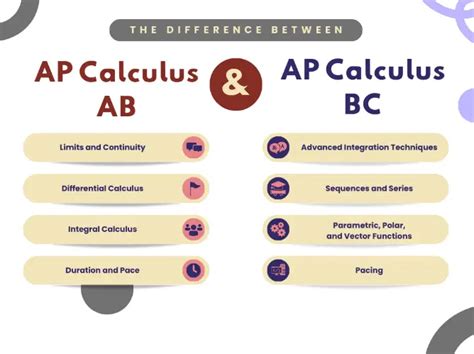For high school students aspiring to excel in mathematics and pursue STEM careers, Advanced Placement (AP) Calculus is an invaluable asset. Within the AP Calculus curriculum, two distinct courses emerge: AB and BC. While both courses provide a foundation in calculus, their contents, rigor, and objectives differ significantly. Understanding these disparities is crucial for students to make an informed decision about which course aligns best with their academic goals and aspirations.

AP Calculus AB is the introductory course in the AP Calculus sequence. It delves into fundamental concepts of differential and integral calculus, including limits, derivatives, and integrals. The course is designed to equip students with a solid understanding of the underlying principles of calculus and their applications to solve real-world problems.
Key Concepts Explored in AP Calculus AB:
- Limits and Continuity
- Derivatives and their Applications
- Integrals and the Fundamental Theorem of Calculus
AP Calculus BC expands upon the concepts covered in AP Calculus AB and introduces more advanced topics in calculus. It covers all of the material in AP Calculus AB, plus additional topics such as parametric equations, polar coordinates, and sequences and series. This course is designed for students who are pursuing careers in STEM fields and desire a more comprehensive understanding of calculus.
Key Concepts Explored in AP Calculus BC (in addition to AB):
- Parametric Equations and Polar Coordinates
- Sequences and Series
- Applications of Integration
The following table provides a concise comparison of the key differences between AP Calculus AB and BC:
| Feature | AP Calculus AB | AP Calculus BC |
|---|---|---|
| Course Level | Introductory | Intermediate |
| Concepts Covered | Limits, Derivatives, Integrals | Includes all AB topics, plus Parametric Equations, Polar Coordinates, Sequences and Series |
| Rigor | Moderate | High |
| Exam Duration | 3 hours 15 minutes | 3 hours 15 minutes |
| Number of Exam Questions | 5 | 6 |
| Scoring | 1-5 | 1-5 |
The choice between AP Calculus AB and BC depends on a student’s individual academic goals and aspirations. To make an informed decision, consider the following questions:
- What is my desired career path?
- Do I intend to pursue further studies in mathematics or a STEM field?
- Am I confident in my mathematical abilities and ready for a rigorous coursework?
- How much time am I willing to invest in studying for the AP exam?
- Attend class regularly and take notes: Active participation in class is essential for understanding the concepts and keeping up with the pace of the course.
- Do your homework and practice problems: Reinforce your understanding by working through homework assignments and practice problems. This will help you identify areas where you need additional support.
- Seek help when needed: Don’t hesitate to ask your teacher or classmates for clarification on concepts or assistance with problems.
- Review regularly: Dedicate time to reviewing previously covered material to strengthen your understanding and retention.
- Prepare for the AP exam: Utilize practice tests and study materials to familiarize yourself with the exam format and question types.
Calculus has broad applications across various fields, including:
- Engineering: Calculus is used to analyze and design structures, develop new technologies, and optimize processes.
- Physics: Calculus is used to describe motion, force, and energy, and to solve problems in classical and quantum mechanics.
- Economics: Calculus is used to model economic growth, predict market trends, and analyze consumer behavior.
- Medicine: Calculus is used to develop medical imaging techniques, analyze patient data, and design new drug therapies.
AP Calculus AB and BC offer distinct paths to advance mathematical skills and knowledge. Whether you aspire to delve into the introductory concepts of calculus or pursue a more comprehensive understanding of its advanced topics, there is a course tailored to your needs. By carefully considering your academic goals and aspirations, you can make an informed decision and embark on a rewarding journey in the world of calculus.
